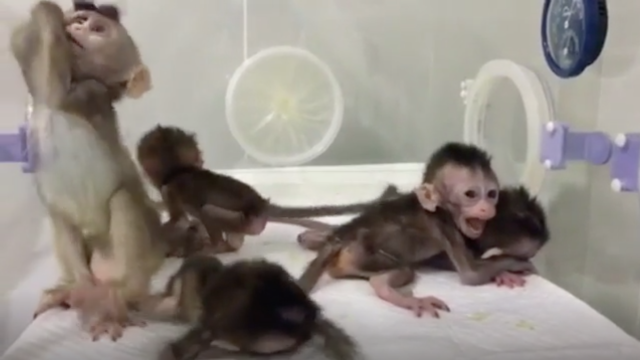Chinese researchers have cloned five gene-edited monkeys with a host of genetic disease symptoms, according to two scientific papers published today.
The researchers say they want to use the gene-edited macaques for biomedical research; basically, they hope that engineering sick primates will reduce the total number of macaques used in research around the world. But their experiment is a minefield of ethical quandaries — and makes you wonder whether the potential benefits to science are enough to warrant all of the harm to these monkeys.
The researchers began by using CRISPR/Cas9 to alter the DNA of a donor macaque. CRISPR/Cas9 is the often-discussed gene editing tool derived from bacteria that combines repeating sequences of DNA and a DNA-cutting enzyme in order to customise DNA sequences. Experts and the press have heralded it as an important advance due to how quickly and cheaply it can alter DNA, but recent research has demonstrated it may cause more unintended effects than previously thought.
In this experiment, the researchers turned off a gene called BMAL-1, which is partially responsible for the circadian rhythm. Monkeys with this gene turned off demonstrate increased anxiety and depression, reduced sleep time, and even “schizophrenia-like behaviours,” according to a Science China Press release. Circadian rhythm disruption has even been linked to diabetes and cancer.
The team then transferred the nuclei from the donor monkey’s tissue cells into an egg cell in order to create the clones. The result was five cloned monkeys, each exhibiting symptoms of the genetic disorder introduced into the donor monkey. The scientists described their results in a pair of papers published in the National Science Review.
But why? Researchers hoped to generate custom model organisms closer to humans in order to understand and find potential cures for genetic diseases, including brain diseases, cancer, and other disorders, Hung-Chun Chang, senior author and investigator from the Chinese Academy of Sciences Institute of Neuroscience said in a statement. By creating identical animals, perhaps they could localise causes and cures more quickly.
This research combines a ton of ethical issues into one package, from those surrounding animal rights to cloning to gene editing. As bioethicist Carolyn Neuhaus from The Hastings Center summarized her reaction to the announcement: “Whoa, this is a doozy.”
“It’s very clear that these monkeys are seen as tools,” she explained. The team of scientists behind the new announcement tout the monkeys’ suffering—anxiety, depression, and “schizophrenia-like behaviours” — as a success. She noted that the researchers didn’t have scientific hypothesis or treatment they were attempting to prove or disprove, and instead were basically just trying to see what would happen if they edited a crucial gene. It’s kind of like deleting a cryptically named file from your computer’s system folder just to see what will happen.
Additionally, these monkeys might appear to be showing behaviours that look like analogues for human diseases, but the comparison between monkeys and humans ends at some point. It’s possible that turning off the BMAL-1 gene would have different effects in humans. And finally, the monkeys’ identical DNA might instead be a weakness. Humans display plenty of genetic differences, so a cure that works for identical macaques might not work when presented to the far messier human genomes.
That’s not to say we shouldn’t genetically edit monkeys, said Neuhaus. But, she said, “if I were on an ethics review committee, I would be very hesitant to approve [this research] because of the incredible amount of harm to the animals. I would expect the scientists who are proposing this research to have very good responses to very hard questions about their methods and the expected benefits of their research.”
Gizmodo has reached out to Chang regarding these ethical concerns, but he did not respond by the time of publication. We will update the post when we hear back.
Things are moving fast in the realms of cloning and gene editing. Chinese scientists (including some of the same researchers behind this new work) announced the birth of the first-ever cloned monkeys almost a year ago to the day, and we hinted that this might be the potential use of the cloned monkeys.
The CRISPR technique is already being used in people, and Chinese scientist He Jiankui recently claimed to have produced the first gene-edited human babies, sparking outrage from many other scientists. The Chinese government has said he broke the law.
Scientists are already discussing the ethics of gene-editing humans, and some have cautiously agreed that it’s “morally permissible” to genetically modify babies in some cases.
New technology always brings up new ethical questions, but the principle that potential benefits should outweigh harms is not a new one. In this latest case, it’s not at all clear the research meets that basic standard.
